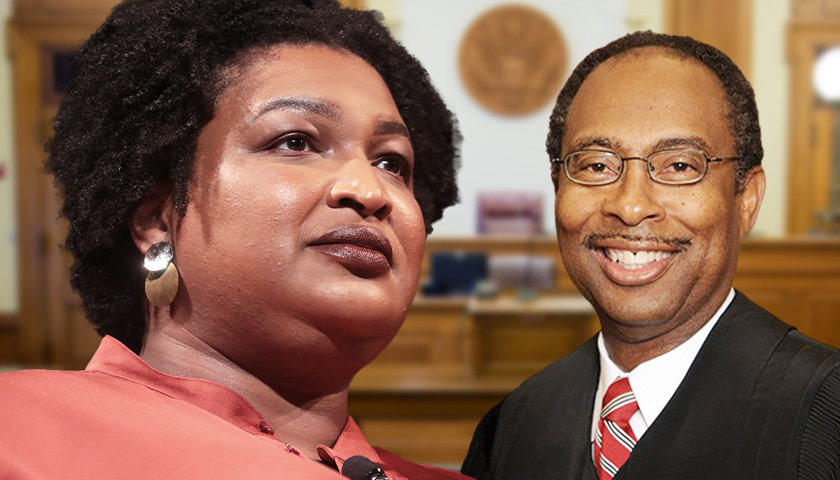by John Solomon
A federal judge ruled Friday that Georgia’s election integrity practices requiring voter ID and citizenship checks are legal and constitutional, rejecting arguments of racism and voter suppression from the state’s Democrat nominee for governor, Stacey Abrams, just weeks before Election Day.
U.S. District Judge Steve C. Jones, an Obama appointee, issued the ruling, after a lengthy trial, handing a major victory to Gov. Brian Kemp and Secretary of State Brad Raffensperger, who aggressively defended the state’s election integrity laws from a legal assault by Abrams voter group Fair Fight Inc. and other liberals.
“Although Georgia’s election system is not perfect, the challenged practices violate neither the constitution nor the VRA,” Jones ruled in a 288-page decision. “As the Eleventh Circuit notes, federal courts are not ‘the arbiter[s] of disputes’ which arise in elections; it [is] not the federal court’s role to ‘oversee the administrative details of a local election.'”
“Having held a non-jury trial and considered the evidence and arguments of the parties, for the foregoing reasons, the Court finds IN FAVOR of Defendants and against Plaintiffs on all remaining Counts of Plaintiffs’ Second Amended Complaint,” the court concluded.
You can read the ruling here.
[wonderplugin_pdf src=”https://tennesseestar.com/wp-content/uploads/2022/10/FILE_9603.pdfFILE_9603” width=”650px” height=”800px” style=”border:0;”]
The ruling was a major blow to Abrams just weeks before voters choose the next governor, and Republicans who squared off against her in the courtroom quickly embraced the win to remind voters Abrams’ prior claims of stolen elections after her 2018 campaign loss and racial voter suppression.
“This is a win for all Georgia election officials who dedicate their lives to safe, secure and accessible elections,” Raffensperger said. “Stolen election and voter suppression claims by Stacey Abrams were nothing but poll-tested rhetoric not supported by facts and evidence.”
Kemp added. “Judge Jones’ ruling exposes this legal effort for what it really is: a tool wielded by a politician hoping to wrongfully weaponize the legal system to further her own political goals,” Kemp declared in a statement.
Abrams, despite losing on every count, celebrated a “hard-won victory” after presenting her losing case. “There’s no denying voter suppression under Brian Kemp and Brad Raffensperger,” she wrote on Twitter.
Jones’ decision borrowed heavily from the U.S. Supreme Court’s landmark ruling last year that upheld Arizona Attorney General Mark Brnovich and his state’s law outlawing ballot harvesting or trafficking. The Brnovich decision, as it is known, was cited heavily as Jones concluded the Georgia laws and regulations requiring voters to pass a citizenship check and voter ID did not violate either the Constitution or the Voting Rights Act.
“With respect to citizenship matching, the Court finds that after weighing the Brnovich guideposts, citizenship matching also does not violate Section 2 of the VRA. … The Court finds that Georgia’s system of voting is equally open.”
On the MIDR legal requirement for voter ID, the judge said he had concluded that the “disparate impact” of photo ID on voters was “de minimis” or legally insignificant.
“Ninety-eight percent or fewer voters are impacted by MIDR, with the exception of Black voters where 97.97% of Black voters were not impacted,” Jones wrote. “The Court finds that the impact of MIDR is like the impact of the Arizona law and does not render the election system unequally open.”
The decision was a stinging loss for Abrams as she makes her second bid against Kemp for governor. She was widely panned for suggesting her 2018 election was stolen and initially refusing to concede, but she gained steam among liberal voting activists in the years that followed.
Trailing now in the polls, Abrams built a fund-raising juggernaut and a national voter rights movement on the argument that states like Georgia disenfranchise minority voters and engage in voter suppression.
“Voter suppression,” she argued in an interview shortly before the 2020 election, “in the 21st century is the province of Republicans.” Long after she conceded the election, she continued to insist she actually won, including in a New York Times article a year later. “I feel comfortable now saying I won,” she said.
Abrams group carried the arguments of an unfair system and racial suppression into the courtroom in 2019 what became one of the longest voting rights cases in state history.
The court found Friday there wasn’t unlawful suppression in Georgia, sometimes in in detailed fashion. While acknowledging there was some racism in the electoral politics of the state, Jones declared Georgia’s election integrity measures were not racially unfair or designed to suppress minority voters.
The judge in a footnote went out of his way to note even one of the Abrams group’s experts “affirmed that he was not opining that any portion of Georgia’s voter registration practices and systems were adopted with a discriminatory intent.”
– – –
John Solomon is an award-winning investigative journalist, author and digital media entrepreneur who serves as Chief Executive Officer and Editor in Chief of Just the News.
Photo “Stacey Abrams” by Gage Skidmore. CC BY-SA 2.0. Photo “Steven C. Jones” by The American Law Institute. Background Photo “Courtroom” by Karen Neoh. CC BY 2.0.





